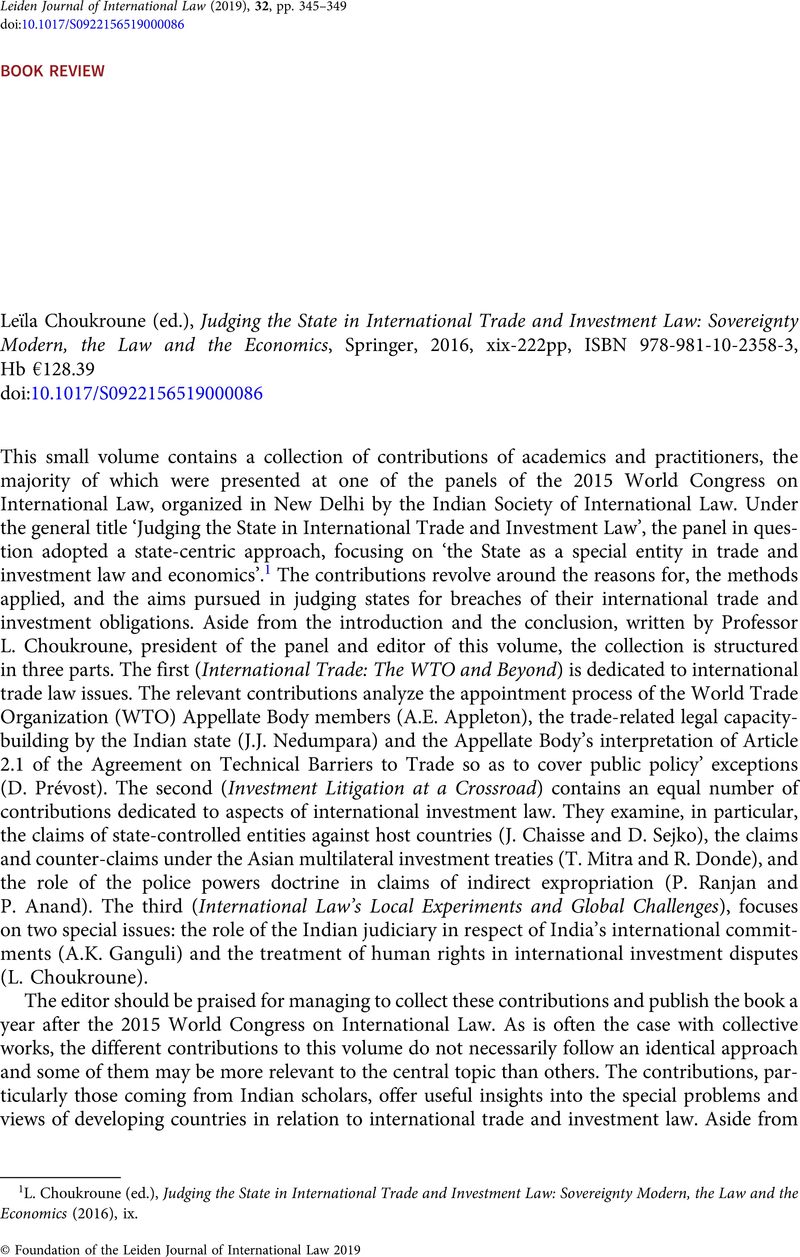No CrossRef data available.
Published online by Cambridge University Press: 07 March 2019

Research Fellow, Centre for American Legal Studies, Birmingham City University, United Kingdom [[email protected]].
1 L. Choukroune (ed.), Judging the State in International Trade and Investment Law: Sovereignty Modern, the Law and the Economics (2016), ix.
2 On TWAIL and the development of TWAIL scholarship see, respectively, M. Mutua, ‘What is TWAIL?’, (2000) ASIL Proc. 31; Gathii, J.T., ‘TWAIL: A Brief History of Its Origins, Its Decentralized Network, and a Tentative Bibliography’, (2011) 3 Trade, Law and Development 26Google Scholar.
3 Choukroune, supra note 1, at 220.
4 Ibid.
5 Ibid., at 222.
6 D. Harvey, The Condition of Postmodernity: An Enquiry into the Origins of Cultural Change (1989), 44.
7 A. Von Bogdandy and S. Dellavalle, Universalism and Particularism as Paradigms of International Law, IILJ Working Paper 2008/3, 22.
8 Cf. Ibid., at 24.
9 Cf. D. Pulkowski, ‘Narratives of Fragmentation: International Law between Unity and Multiplicity’ 4, available at www.esil-sedi.eu/sites/default/files/Pulkowski_0.PDF.
10 Von Bogdandy and Dellavalle, supra note 7, at 20.
11 Ibid.
12 J. Webb Yackee, ‘Toward a Minimalist System of International Investment Law’, (2009) 32 Suffolk Transnational Law Review 303, at 321.
13 Fidler, D.P., ‘Revolt Against or From Within the West?: TWAIL, the Developing World, and the Future Direction of International Law’, (2003) 2 Chinese Journal of International Law 29, at 30.CrossRefGoogle Scholar
14 Ibid., at 31.
15 Chimni, B.S., ‘Third World Approaches to International Law: A Manifesto’, (2006) 8 International Community Law Review 3, at 4Google Scholar.
16 Ibid., at 7, 14.
17 See, for example, Protopsaltis, P.M, ‘The Development of US and EU Preferential Trade Agreements Networks: A Tale of Power and Prestige’, (2017) 48 Netherlands Yearbook of International Law 3CrossRefGoogle Scholar.
18 Gathii, J.T., ‘Third World Approaches to International Economic Governance’, in Falk, R., Stevens, J. and Rajagopal, B. (eds.) International Law and the Third World: Reshaping Justice (2008), 261Google Scholar.
19 Fidler, supra note 13, at 55.
20 Golub, P.S., ‘From the New International Economic Order to the G20: how the “global South” is restructuring world capitalism from within’, (2013) 34 Third World Quarterly 1000, at 1007CrossRefGoogle Scholar.
21 Sapir, A., ‘Europe and the Global Economy’, in Sapir, A. (ed.), Fragmented Power: Europe and the Global Economy (2007), 1, at 7Google Scholar.
22 Griffith, M.K., Steinberg, R.H. and Zysman, J., ‘From Great Power Politics to a Strategic Vacuum: Origins and Consequences of the TPP and TTIP’, (2017) 19 Business and Politics 1, at 4CrossRefGoogle Scholar.
23 On the judicialization – and the consequent depoliticization – of the multilateral trading system through the WTO dispute settlement mechanism see, for example, Howse, R., ‘The World Trade Organization 20 Years On: Global Governance by Judiciary’, (2016) 27 EJIL 9, at 19CrossRefGoogle Scholar.
24 J.J. Nedumpara, ‘WTO, State and Legal Capacity Building’, in Choukroune, supra note 1, at 34.
25 B. Kingsbury and S.W. Schill, Investor-State Arbitration as Governance: Fair and Equitable Treatment, Proportionality and the Emerging Global Administrative Law, New York University Public Law and Legal Theory Working Papers, paper 146/2009, 1–7, passim; cf. A. Von Bogdandy and I. Venzke, In Whose Name? A Public Law Theory of International Adjudication (2014).
26 Kingsbury, B. and Schill, S.W., ‘Public Law Concepts to Balance Investor’s Rights with State Regulatory Actions in the Public Interest – The Concept of Proportionality’, in Schill, S.W. (ed.), International Investment Law and Comparative Public Law (2010), 75, at 77CrossRefGoogle Scholar.